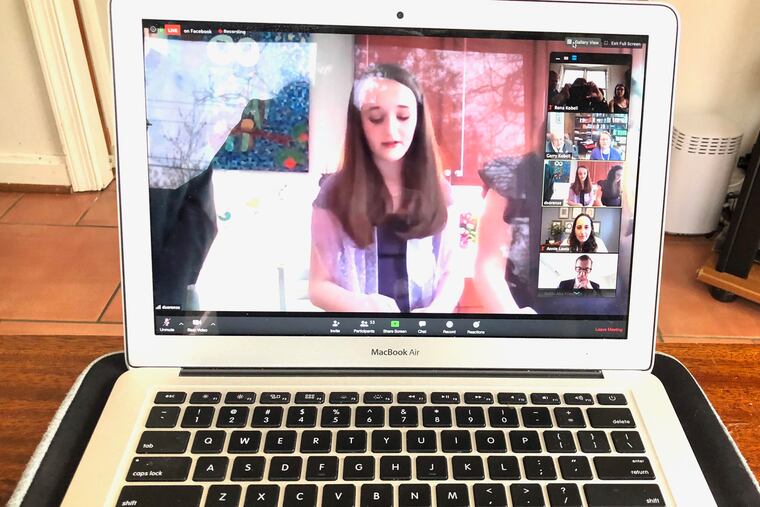A Zoom Bat Mitzvah brought our family together from Philly to Israel | Perspective
We may require distance, but even when a major coming-of-age ritual gets moved online, that doesn’t mean we need to be apart.

Nineteen years ago this month, my sister was diagnosed with breast cancer.
She was 29 years old.
She was worried: about losing her breast, about dying, about chemotherapy. But mostly, she worried she’d never be able to have a child.
On the way into the operating room, a surgical fellow she’d never met saw her crying and stopped her. He told her she was at one of the best hospitals in the country — the University of Pennsylvania — with the best oncologists and surgeons working on her case. Whatever happened next, the fellow told her, was up to God. It was Nissan, the Hebrew month of miracles. If she had faith, he told her, the extraordinary could happen.
It did. She survived the cancer, and in 2006 she gave birth to a baby girl. Named Eve Helena, after our mother, she is believed to be the first baby to be born in the world from an embryo that had been screened for the BRCA genes that carry markers for cancer. Thanks to scientific advances in pre-implantation diagnosis, the persistence of Michigan geneticist Mark Hughes, and the fertility doctors and embryologists at Abington Hospital, we knew that my niece would not be at increased risk of battling the breast disease her mother had to fight. She was also safe from the ovarian cancer that had killed her grandmother and great-aunt when Eve was an infant.
» READ MORE: Philadelphia religious groups change practices due to coronavirus
Eve, now 13, dances ballet and plays piano. She excels in school, particularly her Torah studies and Hebrew reading, which she learned from attending Perelman Jewish Day School and the Jack M. Barrack Hebrew Academy. Like her mother, she’s a talented artist. When a sister came along, she gracefully shared her room for a time. And so, when it came time to plan her Bat Mitzvah, my sister wanted to honor her with something really special. There were to be events at the synagogue, a party at home, followed by a trip — maybe somewhere warm?
Everything was on track for the April 4 festivities. Guests booked hotel rooms, reserved flights, parceled out parts of the service, and made invitations. Our family expected guests from around the world, including England, Israel, Canada, and Bermuda.
The Europeans were the first to cancel, worried they wouldn’t be able to return home. Then the Canadians, followed by the Israelis, and then far-flung domestic relatives in Chicago and friends in Florida. My brother, in Lower Merion, said he likely couldn’t drive the 11 miles to the synagogue with his family because of restrictions there. So, it looked to be a small gathering at the synagogue.
» READ MORE: Gathering via Zoom isn’t as good as the real thing, but during a pandemic you get what you get | Jenice Armstrong
Then the synagogue closed, and we planned for an intimate Bat Mitzvah in her Center City home — my family driving from Baltimore, my father and stepmother from Pittsburgh. Then the governors said no more than 10 people could gather, and it got even smaller. And then they said those crossing state lines had to quarantine upon return, the stay-at-home orders came out, and suddenly driving to Philly from my home in Baltimore and my father’s place in Pittsburgh seemed out of the question.
My sister kept hoping for a miracle. Finally, she had to call it. Eve Kobell would be the first Zoom Bat Mitzvah at her Philadelphia congregation Temple Beth Zion-Beth Israel.
It’s not easy to be first, whether an embryo vying for a cancer-free life or a teen-ager having a Bat Mitzvah without friends by her side or a Torah to hold. There would be no hugging rarely-seen relatives, no chair lifting while we sang Hava Nagila and danced the Hora. She wouldn’t even get to have her Bat Mitzvah on Saturday morning, as is tradition, because Conservative rabbis will not use technology on the Sabbath. (They may want to rethink that in pandemic times.)
» READ MORE: As Zoom meetings invade our homes, we’re spending more time than ever with our coworkers — and their prying eyes
And so, on Friday, April 3 at 3 p.m., about 75 computers representing nearly 200 guests logged on to Zoom to hear Eve become a Bat Mitzvah. (The midday hour ensured it would conclude before sundown per the rabbi’s rules.) She read five passages of Torah, chanted her Haftorah portion, and led the service. Her proud parents embarrassed her with gushing speeches. From a half dozen countries, we threw candy at the computer screens and shouted our “Mazel Tovs!”
The rabbi Eve studied with, Annie Lewis, chanted beautiful blessings, including a prayer for safety and peace during this pandemic. In the real synagogue, a pre-schooler running onto the bimah while her mom was in the midst of leading prayer could be distracting, maybe even prompt disruptive audience chatter. But when Rabbi Annie’s daughter climbed into her lap as she helped lead prayers, it was adorable.
» READ MORE: Zoom bombing: What it is, and how to stop it from ruining your coronavirus events
The surgical fellow was right. Nissan delivered, and it was extraordinary. We may require distance, but that doesn’t mean we need to be apart. We survive, we adapt, we accept, and we pray. For 90 minutes, we were truly together, even though physically we were alone.
Rona Kobell is a science editor and writer for Maryland Sea Grant College and a former Baltimore Sun reporter. She also teaches at the University of Maryland’s Philip Merrill College of Journalism.